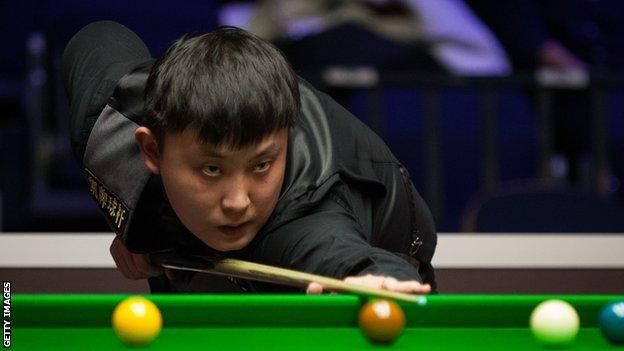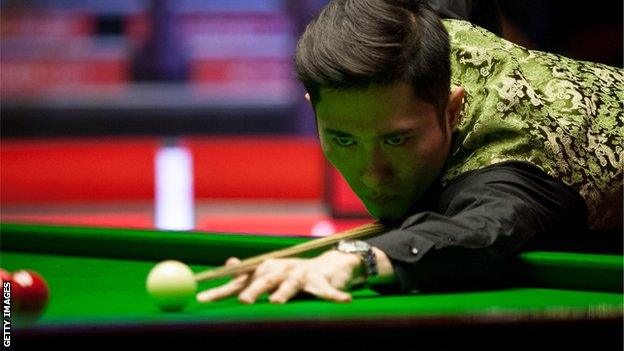Yu Delu and Cao Yupeng match-fixing: Chinese pair banned in snooker corruption scandal
- Published

Yu Delu's highest finish at a ranking event was the semi-finals of the 2016 Scottish Open
China's Yu Delu has been banned from snooker for 10 years and nine months after a major match-fixing inquiry.
His compatriot Cao Yupeng also pleaded guilty to fixing and was banned for six years, although three and a half years of his sentence are suspended.
Suspicious betting patterns in numerous matches were investigated over two years in one of the sport's biggest corruption scandals.
Yu has been described as a "scourge to the game of snooker".
As reported first by the BBC, the pair are the first Chinese players to be banned for cheating.
Yu, who manipulated the outcome of five matches over a two-and-a-half-year period, will serve the longest suspension since English player Stephen Lee was given a 12-year ban in 2013.
In one match, the stakes placed on the result totalled £65,000, which would have generated a profit of £86,000.
The 31-year-old reached the semi-finals of the 2016 Scottish Open and was ranked 43 in the world when he was charged.
Twenty-eight-year-old Cao, who fixed three matches, was runner-up in the Scottish event last year and world number 38 when initially suspended in May.
Both players were investigated by the World Professional Billiards and Snooker Association (WPBSA) before an independent tribunal ruled on their cases.
The tribunal, chaired by David Casement QC, found that Yu "engaged in deliberate and premeditated corruption to secure substantial financial gain for his friends/associates and himself."
Yu also admitted lying to the investigator, failing to cooperate with the inquiry and betting on snooker when prohibited from doing so.
"It is very sad when talented players are attracted to the opportunity to make money from fixing matches," said WPBSA chairman Jason Ferguson.

Cao Yupeng "expressed his sorrow" over match-fixing and said he had financial difficulties
The fixed matches
Yu Delu admitted fixing in five matches:
Indian Open qualifiers: WON 4-3 v Martin McCrudden - 12 February 2015
Paul Hunter Classic: LOST 4-1 v Dominic Dale in Germany - 29 August 2015
Welsh Open: WON 4-3 v Ian Glover - 15 February 2016
European Masters qualifiers: LOST 4-1 v Michael Georgiou - 4 August 2017
Shanghai Masters: LOST 5-3 v Kurt Maflin - 15 November 2017
He also failed to report approaches to fix matches, did not cooperate with the investigation and breached rules by betting on snooker.
The scandals involved betting on markets in the Far East.
Yu won two of the five fixed matches, but had arranged for the correct score to be 4-3 to either player.
There is no suggestion any of the opponents were aware of the match-fixing plan.
Cao Yupeng admitted fixing in three matches:
Welsh Open: LOST 4-1 v Ali Carter - 15 February 2016
Indian Open qualifiers: LOST 4-0 v Stuart Bingham - 30 June 2016
UK Championship: LOST 6-1 v Stephen Maguire - 24 November 2016
Cao also failed to provide material that was requested during the investigation.
He told investigators that he received £5,000 for each of the matches he fixed and he was initially given an eight-year ban, but this was reduced to six - three and a half of which were suspended - because of his co-operation with the inquiry.
"Cao Yupeng has shown true remorse and he will assist the WPBSA in player education and in its fight against corruption, which is reflected in his reduced sanction," said Ferguson.
Yu was given a 12-year ban, to match the sanction imposed on Lee five years ago, but this was reduced to 10 years and nine months because of his late guilty plea.
Analysis
Jamie Broughton, 5 live snooker reporter
These two players are well known in China, and this story will be headline news there.
Lengthy bans show that the sport's world governing body, the WPBSA, has the capability and desire to investigate such cases all over the world, and not just in Europe.
Sanctions like this send out a clear message to any player tempted to get involved in match fixing that it's not worth the risk of getting caught.